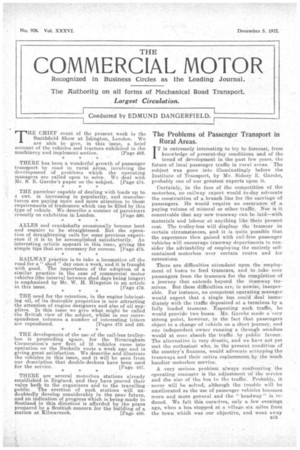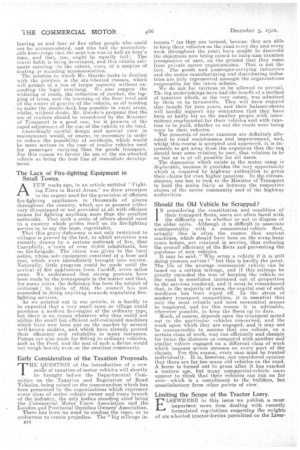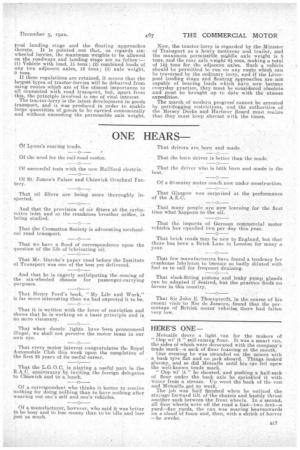The Problems of Passenger Transport in ' Rural Areas.
Page 1

Page 2

Page 3

If you've noticed an error in this article please click here to report it so we can fix it.
IT is extremely interesting to try to forecast, from knowledge of .present-day conditions and of the trend tif development in the past few years, the future of local passenger traffic in rural areas.: The subject was gone .into illuminatingly before the Institute of Transport, by Mr. Sidney E. Garcke, probably one of our greatest experts upon it.
Certainly, in the face of the competition of the motorbus, no railway expert would to-day advocate the construction of a branch line for the carriage of passengers. He would require an assurance of a paying volume of mineral or other traffic. Nor is it conceivable that any new tramway can be laid—with materials and labour at anything like their present cost. The trolley-bus will displace the tramcar in certain circumstances, and it is quite possible that the experience then gained with rail-free passenger vehicles will encourage tramway departments to consider the advisability of employing the entirely selfcontained motorbus over certain routes and for extensions.
There are difficulties attendant upon the employment of bus'es to feed tramdars, and to take over passengers from the tramcars for the completion of a journey that extends beyond the tramway terminus. But those difficulties are, in nowise, insuperable. For instance, no competent operating manager would expect that a single bus could deal immediately with the traffic deposited at a terminus by a fully loaded tramcar. 'Expecting such traffic, he would provide two buses. Mr. Garcke made a-very strong point, however, in the fact. that passengers object to a change of vehicle on a short journey, and any independent owner running a through omnibus would at once absorb the traffic by public favour. The alternative is very drastic, and we have not yet met the enthusiast who, in the preSent eondit•ion of the country's finances, would advocate scrapping the tramways and their entire replacement by the much
handier motorbus service. _. .
A very serious problem always confronting the operating manager is the adjustment of the service and the size-of the bus to the traffic. Probably, it never will 'be solved, although the trouble will be ameliorated as the use of passenger vehicles becomes more and more general and the " headway "is 'reduced. We felt this ourselves, only a few evenings ago, when a bus stopped at a village six miles from the town which was our objective, and went away
leaving us and four or five other people Who could not be accommodated, ;aid who had the uncomfortable knowledge that the next bus was in hall an hour's time, and that, too, might be equally full! The travel habit is being developed, and this entails adequate catering—to the extent, even, of a surplus of seating or etanding accommodatm. The solution to which Mr. Garcke looks in dealing with the 'problem is the six-wheeledchassis, which will permit of a bus of larger capacity without exteeding the legal overhang. We also suggest the widening of roads, the reduction of camber, the lop-. ping of trees, and the lowering of the floor level and of the centre of gravity of the vehicle, as all tending to make the double-deck bus possible in rural areas, whilst, without doubt, Mr. Garcke's proposal that the use of trailers should be considered by the Minister of Transport is a good one, for it permits of the rapid adjustment. of the size of the vehicle to the load.
Exceedingly careful design and special care in maintenance would, of course, be necessary in order to reduce the possibility of accidents, which would be more serious in the Case of trailer vehicles used for passenger carrying Than for goods transport.. For this reason we favour the use of the six-wheeled vehicle as being the best line of immediate development. •
The Lack of Fire-fighting Equipment in Small Towns. ,
A. FEW weeks ago, in an article entitled "Fighting Fires in Rural Areas," we drew attention to the urgent need for the provision of efficient fire-fighting appliances in thousands of places throughout the country, which are at present either
very ill-equipped or not provided at all with efficient means for fighting anything more than the smallest outbreaks. That such a state of affairs should exist in a country which prides itself on its fire-fighting service is, to say the least, regrettable.
That this grave deficiency is not only restricted to villages is proved by the fact, to which attention was recently drawn by a serious outbreak of fire, that Caerphilly, a 'town of over 10,000 inhabitants, haz no fire-brigade. The alarm was given to the !ocal police, whose. sole equipment consisted of a hose and reel, which were immediately brought into service. Naturally, little progress could be made until the arrival of fire appliances from Cardiff, seven miles away. We understand that strong protests have been made by the townspeople in the matter and that, for many years, the deficiency has been the subject of criticism ' • in spite of this, the council has not . succeeded in doing anything towards organizing firefighting services. As we pointed out in our article, it is hardly to be expected that a very small town or village could pure-ha-se a Modern fire-engine of the ordinary type, but there is no reason whatever why they could not utilize the small but efficient self-contained machines which have now been put on the market by several well-known makers, and which have already proved their efficiency and reliability in many instances. Pumps are also made for fitting to ordinary vehicles, such as the Ford. and the cost of such a device would not weigh heavily even on the smallest community.
Early Consideration of the Taxation Proposals.
THE QUESTION of the introduction of a new mode of taxation of motor vehicles will shortly be brought before the Departmental Committee on the Taxation and Regulation of Road Vehicles, being raised on the memorandum which has been presented by the organizations which represent every 'class of motor vehicle owner and every branch of the industry, the only bodies standing aloof being the Commercial Motor Users Association and the London and Provincial Omnibus Owners' Association.
There has been no need to confuse the issue, or to endeavour to create prejudice. The " big mileage in Bin terests " (as they are termed, because they are able to keep their vehicles on the road every day and every week throughout the year) have sought to discredit the objections now being raised to lump-sum taxation irrespective of user, on the ground that they come from private motor organizations.That is not the fact. The goods and passenger-carrying industries and the motor manufacturing and distributing industries are fully represented amongst the organizations responsible for the latest scheme. We do ask for fairness to be allowed to prevail. The big undertakings have had the benefit of a method of taxation which, at the very outset, was admitted by them to be favourable. They will have enjoyed that benefit for four years, and their balance-sheets will hardly support any contention that they have been so badly hit as the smaller people with intermittent employment for their vehicles and with taxation to be paid, whether or not the roads were being worn by their vehicles. The proceeds of motor taxation are definitely allocated to road maintenance and improsTement, and, whilst this course is accepted and approved, it 'is impossible to get away from the argument that the ta4 should bear some relation to user, that relation to be as fair as is at ail possible for all users. , The dissension which exists in the motor camp is deplorable, because it provides the very opportunity which is required by highway authorities to press their claims for even higher taxation. In the circumstances, one has to look to the Minister Of Transport to hold the scales fairly as between the respective claims of the motor community and of the highway authorities.
Should the Old Vehicle be Scrapped ?
IN -considering the constitution and condition of their transport fleets, users are often faced with the difficulty as to whether or not to dispose of the older units. Although it is difficult to associate sentimenta,litywith a .conimercial-vehicle fleet, actually this is often the reason that ancient machines, which should have been on the scrap-heap years before, are retained in service, thus reducing the overall efficiency of the fleets mid preventing the purchase of new vehicles.
It may be said, " Why scrap a vehicle if it is still doing yeoman service ? " but this is hardly the point. The life of the 'average commercial vehicle can be based on a certain mileage, and if this 'mileage be greatly exceeded the cost of keeping the vehicle on the road is sometimes increased out of proportion to the services rendered, and it must be remembered that, in the majority of cases, the capital costof such
machines has been wiped off.the stress of modern transport. competition, i is essential that only the most reliable and most economical means he employed, and for this reason it is advisable, wherever possible, to keep the fleets up to date.
Much, of course, depends upon the treatment meted out to the particular vehicles concerned, and the work upon which they are engaged, and it may not be unreasonable to assume that one vehicle, on a certain class of work, may run efficiently and cheaply for twice the distance as compared with another and' similar vehicle engaged on a different class of work which imposes severe stresses on every part of the chassis. For this reason, every case must be treated individually. It is, however, our considered opinion that there are far too many old vehicles on the road. A horse is turned out to grass after it has reached a mature age, but many commercial-vehicle users appear to think that their vehicles can run on for ever-----which is a compliment to the builders, but unsatisfa,ctory from other points of view.
Limiting the Scope of the Tractor Lorry.
LSEWHERE in this issue we publish a most important news item dealing with recently
formulated regulations respecting the weights of six-wheeled tractor-lorries permitted on the Liver pool landing stage and the floating approaches thereto. It is pointed out that, as regards sixwheeled lorries; the maximum weights to be allowed on the roadways and landing sta.geare as follow :— (1) Vehicle with load, 15 tons.; (2) combined loads of any two adjacent axles, 12 tons; (3) axle weight, 9 tons.
If these regulations are retained, it means that the largest types of tractor-lorries will be debarred from using routes which are of the utmost importance to all connected with road transport, but, apart from this, the principle involved is one of vital interest. The tractor-lorry is the latest development in goods transport, and it was produced in order to enable large quantities of goods to be carried -economically and without exceeding the permissible axle weight. Now, the tractor-lorry is regarded by the Minister of Transport asaheavy motorcar and trailer, and the maximum permissible middle axle weight is S tons, and the rear axle weight 6i tons, making a total of 14i tons for the adjacent axles. Such a vehicle should be permitted to run on any route which can be traversed by the ordinary lorry, at id if the Liverpool landing stage and floating approaches are not capable of bearing loads which have now become everyday practice, they must be considered obsolete and must be brought, up to date with the utmost expedition.
The march of modern progresi cannot be arrested by pettifogging restrictions, and the authorities of the Mersey Docks and Harbour Board must realize that they must keep abreast with the times.
































